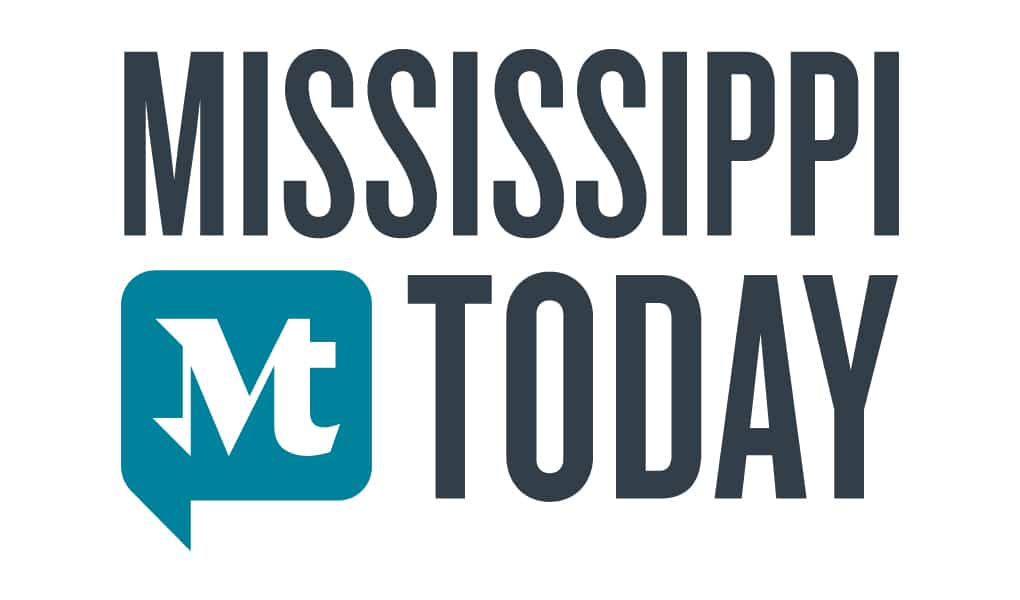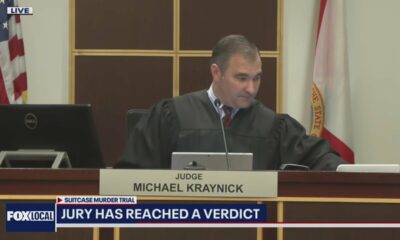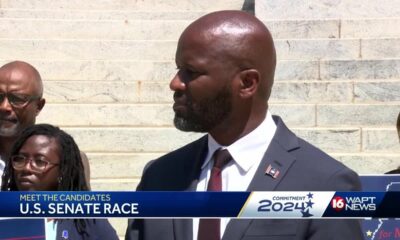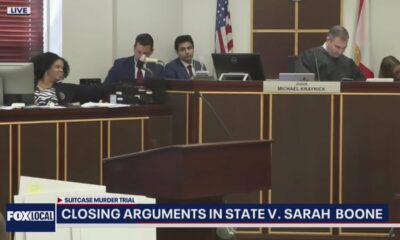Mississippi Today
Mississippi Today’s Molly Minta named a finalist for national education award

For the second straight year, Mississippi Today and Open Campus reporter Molly Minta was named a finalist for a coveted Education Writers Association award.

The annual awards recognize the best education reporting in newsrooms big and small across the nation. Minta is one of three finalists in the small newsroom division of the beat reporting category, which honors excellence in everyday education reporting.
Minta, who was also named a finalist last year for an EWA award for feature reporting, was honored this year for several stories that uncovered secrecy and unfairness in Mississippi’s higher education system.
Higher education in Mississippi is a black box, but through public records requests, sourcing and shoe leather reporting, Minta revealed how secrecy operates at various levels of higher education in the state — including stories about public officials debating new ways to spend millions of dollars of state financial aid in closed-door meetings, and an investigation that found university hospital leaders told employees not to communicate in writing about their decision to stop treating trans kids at an LGBTQ+ clinic.
“Molly’s impact as a reporter in Mississippi speaks for itself, and she more than deserves to be recognized among the very best education reporters in America,” said Adam Ganucheau, Mississippi Today editor-in-chief. “We’re also very proud to have such a strong partner in Open Campus, which values the importance of strong local journalism.”
Minta’s articles that EWA jurors considered for this year’s award included:
- Public officials met in ‘confidence’ to overhaul state financial aid. Their proposal could become law.
- Handwritten notes show what IHL trustees thought during JSU listening session
- A USM student spoke out about a candidate for provost. Then they got an email from one of the school’s biggest donors.
- How a business consultant with a history of domestic violence allegations took over the Delta State music department
- Facing political pressure, UMMC cut care to trans kids before the Legislature banned doing so, emails show
The other two finalists in the small newsroom division for beat reporting are Brian Lopez of The Texas Tribune and Kate McGee of The Texas Tribune and Open Campus. The winner will be announced on May 30 at EWA’s national seminar in Las Vegas.
This article first appeared on Mississippi Today and is republished here under a Creative Commons license.
Did you miss our previous article…
https://www.biloxinewsevents.com/?p=346155
Mississippi Today
New radio show heightens concerns of Republican influence at Mississippi Public Broadcasting


Russ Latino, a former lobbyist and cheerleader for some of the most radical policies in Mississippi, has been no stranger to lawmakers at the Mississippi Capitol for the past decade.
His extensive advocacy included promoting bills that would expand the flow of taxpayer dollars to private schools and drastically slash state spending, including for public education. In the summer of 2021, he was invited by legislative Republicans to testify in a hearing that Mississippi should eliminate its income tax, which funds about one-third of the state’s general budget.
His political work is also notorious. He helped lead an alliance of Republican Party leaders and special interest groups who successfully fought against a 2015 statewide referendum that would have compelled lawmakers to fully fund public schools. He was also a public proxy for far-right state senator Chris McDaniel’s insurgent and scandal-ridden 2014 bid for U.S. Senate against Thad Cochran.
But Latino’s visit to the Capitol one day late in the 2021 legislative session was not for lobbying purposes. He’d just been nominated by Gov. Tate Reeves to serve on the board of directors of Mississippi Public Broadcasting, the venerated statewide public radio and television network, and he had to stand before the Senate Education Committee for his confirmation hearing.
“Currently, my job is oriented around public policy and thinking through solutions for the state,” Latino told senators in the March 25, 2021, hearing. “… In my mind, there’s a pretty big separation between the things I work on in my public policy work and the work of Mississippi Public Broadcasting. I don’t see any intersection, I don’t see any conflict, and I was comfortable after thinking about it that there wasn’t really any conflict between the two.”
The senators apparently agreed, voting unanimously to confirm his appointment. For the next three-plus years, Latino served on the MPB board and helped oversee the operations and budget of the public television and radio network that generations of Mississippians have come to trust as a champion of critical public education initiatives and journalistic independence.
MPB, an organization which employs about 90 people, was created by the Mississippi Legislature in 1969 to provide “educational and instructional professional growth and public service programs for the students and citizens of Mississippi.”
Thousands of individual donors give to MPB’s nonprofit foundation, which helps underwrite some programming for the network. But the vast majority of MPB’s annual funding comes directly from the Legislature, which appropriates millions in taxpayer dollars to the state agency each year to operate its statewide network and pay its staff.
This year, lawmakers appropriated $11.2 million for MPB. Though the agency’s annual appropriation from the state fluctuates each year based on need, this year’s appropriation is nearly $1 million less than the agency received a decade ago.
Funding MPB with taxpayer dollars has long been a perilous prospect. Numerous times in recent years, Republicans, who have complete control of the Legislature’s two chambers and the state budget, have threatened to slash the network’s appropriation. In 2024, 23 Republican House members voted against funding MPB altogether — up from 21 House Republicans who voted against funding in 2023 and 15 House Republicans who voted against funding in 2022.
MPB, like most public radio affiliates, airs several National Public Radio shows every day, and some Republican lawmakers have been quick to equate MPB’s local programming with their national counterparts. In reality, though, state dollars do not pay for NPR programming, and MPB’s leadership has for years instructed hosts of local programming to avoid politics altogether. MPB’s newsroom, which operates independently of the network’s other local programming, does closely cover state politics and government.
Latino was an unorthodox board appointee even for Reeves, who has long used his offices to appoint political allies and people who share his political views. Latino had scant professional experience in either an educational or journalistic setting — a typical qualification for MPB board members. Nonetheless, after his confirmation, he was an active board member during his term, routinely engaging in important conversations about organizational matters and eventually serving as vice chair of the board.
Among the major moves MPB made during Latino’s board term was the hiring of a new MPB executive director named Royal Aills.
A potential conflict of interest
In late 2022, with about a year-and-a-half left on Latino’s board term, an announcement shocked several MPB employees and seemed to counter Latino’s assurance to senators that his term would be free of conflict: He was launching a digital news organization called The Magnolia Tribune.
The Magnolia Tribune, Latino told friends and family in a December 2022 email, would seek to disrupt Mississippi’s existing media landscape — one that prominently included the newsroom that fell under his purview at MPB.
“Faith in traditional media has been undermined by blatant bias and often by careless reporting of complex issues,” Latino wrote in his announcement. “We will work to restore trust… While our commentary will often appeal to conservatives, we will not shy from providing a platform for divergent viewpoints.”
The potential for conflict between the mission of his upstart newsroom and MPB’s newsroom was apparent enough to Latino that he requested an opinion from the Mississippi Ethics Commission in January 2023.
“My question relates not to any pecuniary benefit, but to whether there is a conflict of interest in the Ethics Commission’s mind of being involved in providing news at (The Magnolia Tribune) when (MPB) also provides news,” Latino wrote to the Ethics Commission. “In my estimation, there is not. We have very different revenue models, very different products, and different audiences. It’s not inconceivable that there could occasionally be overlap in coverage or audience, though.”
Latino may not have been worried about any potential conflict, but staffers at the state agency he oversaw certainly were, current and former MPB staffers who spoke with Mississippi Today said. They expressed concerns with their colleagues about Latino’s new media venture and that they feared senior MPB leaders might become influenced by their board member’s views about the media at large.
“It’s no wonder trust in the media is plummeting. The industry is in crisis, but simultaneously self-satisfied, smarmy, and condescending toward critics.”
Russ Latino on Oct. 22, 2024
In response to Latino’s request, the Ethics Commission, a board appointed completely by the state’s top Republican Party elected officials, ruled that there was no conflict of interest and that Latino could continue serving on the MPB board with one caveat.
“(Latino) may not use his position on the board to obtain or attempt to obtain any pecuniary benefit for himself…, ” the Ethics Commission wrote in an April 7, 2023, opinion. “(Latino) also states (The Magnolia Tribune) will not enter a contract with or provide services to (MPB). If those circumstances change during (Latino’s) term of office on the board or within one year thereafter, a violation of Section 109, Miss. Constitution of 1890, and Section 25-4-105(2) and (3)(a) could arise. In that event, (Latino) would need to seek a supplemental opinion.”
Cleared then of any conflict by the Ethics Commission, Latino remained on the MPB board while continuing to launch his own newsroom.
Anti-press, anti-public education views
During the course of The Magnolia Tribune’s existence, Latino has published columns and fired off social media posts that are deeply critical of Mississippi journalists, news outlets and the American press at large.
Latino often rushes to critique unfavorable coverage of Mississippi’s Republican politicians, in particular, fueling speculation about Latino’s true motives with his news outlet. Several on MPB’s staff, they told Mississippi Today, paid close attention to their board member’s constant criticism of the press.
“… It is understandable that a Republican politician might begin to believe that it does not matter how reasonable their answer, they are better off not trusting media to be fair,” Latino wrote during the 2023 gubernatorial campaign.
“It’s no wonder trust in the media is plummeting,” Latino wrote just this month, repeating his regular refrain. “The industry is in crisis, but simultaneously self-satisfied, smarmy, and condescending toward critics.”
Latino has also used his outlet as the homepage for proponents of what he calls “school choice” — a Republican-parroted catchphrase that includes various measures that would ultimately pump public dollars into private schools. Latino spent years advocating for these causes on behalf of Americans for Prosperity, a national Koch brothers-founded dark money organization. After he left AFP, he lobbied for the same issues as senior vice president at Empower Mississippi.

For years, MPB staffers quietly watched on as Latino held a board seat for an agency funded by the state under the banner of public education all while using his own news outlet to pressure lawmakers into passing policies that stood to take dollars out of public education coffers.
“What’s certain is that self-avowed ‘conservatives’ were not actively working to torpedo efforts to empower parents in (neighboring) states,” Latino wrote in a March 2023 piece that blasted Mississippi’s Senate Republicans for rejecting a Reeves political appointee who unabashedly supported allowing public dollars to benefit private schools. “The time for half-measure and obfuscation is over. It’s time for leaders to publicly declare if they will stand with parents and for children, or for a status quo that has held many students back from finding success.”
“It’s not only good policy. It’s good politics,” Latino wrote shortly before the 2024 legislative session began. “Mississippi has made tremendous strides in education in recent years. It need not take its foot off the accelerator. Effective choice programs that empower parents are one more tool in the arsenal to continue growth.”
After a year-and-a-half of both serving on the MPB board and running his news outlet, Latino’s term on the board expired on June 30, 2024.
Gov. Reeves then appointed Cory Custer, the governor’s current deputy chief of staff who serves as a spokesman for the governor’s office. Before he joined Reeves’ staff, Custer served as a Trump administration appointee.
Custer carries the same “liberal media bias” torch as Latino, routinely issuing public statements on behalf of Reeves that attempt to discredit news outlets and individual journalists.
During Custer’s first MPB board meeting in July, three senior staff members from National Public Radio joined via video conference. According to board minutes, Custer “pressed NPR staff about bias in their newsroom. He asked for specific changes that have been implemented to combat bias. Following that discussion, Custer requested that MPB leadership continue to hold NPR accountable for implementing legitimate observable and quantifiable changes to combat bias in their newsroom.”
Around the time of that same board meeting, plans for a new MPB radio show were underway.
A ‘new and interesting’ MPB show is born
Senior MPB staffers were informed over the summer by Aills, the executive director who Latino helped hire, that their former board member would soon be getting his own radio show.
MPB staffers across several internal departments were tasked with working with Latino to develop the concept.
It would be a weekly interview show called “The Sit Down with Russ Latino,” featuring conversations with politicians. Despite a years-long edict from MPB leadership that in-house programming must remain free from overt politics, the new show would not avoid mention of major political issues. Latino would have editorial control of his show, and he’d get the 10 a.m. hour every Wednesday morning.
Aills told Mississippi Today that the show was his idea.

“I have been discussing the idea for this type of show for a while, along with other staff members who, in their current roles, make content and programming decisions at MPB,” Aills said in an emailed response to several questions for this article. “… I think that it is important to have a show like this, not because Russ Latino is hosting the show necessarily — it really could be anyone — but I think this type of show is important because it provides something new and interesting to our current lineup.”
Latino, who said he is not being compensated for the show by MPB or its foundation, told Mississippi Today he hopes the show will “create content that makes people think deeply about the issues that matter and to more fully embrace the wonderful aspects of Mississippi’s culture.”
As MPB executive director, Aills lives in a state of political difficulty.
On one hand, he must navigate an incredibly media-hostile Legislature that almost totally controls his agency’s annual budget. Concerns over the threat of politically-inspired budget cuts at MPB have long been openly discussed among staff across all departments, and that pressure is felt most directly in the MPB executive suite.
On the other hand, Aills has a loyal donor base and listenership in Mississippi that relies on and deeply appreciates NPR programming.
Asked if the creation of Latino’s show was an effort to provide what some may consider “political balance” to satisfy certain Mississippi politicians, Aills was blunt in his denial.
“No. At MPB, we serve all of Mississippi — that means sharing the thoughts and opinions of everyone who makes up the state, not just the ones who share similar political viewpoints or beliefs,” Aills said. “This is not a measure to appease any select group. This is trying to create programs that offer a little something for everyone… In order to grow our audience, we believe that we have to expand our programming offerings to entice new audiences with new content.”
A skeptical MPB staff presses for answers
Internal conversations at MPB tell a slightly different story than the one Aills laid out in his answers to Mississippi Today: He has for months been considering changes to local programming amid the political pressure.
In an at times contentious July 2024 all-staff meeting, Aills was asked by colleagues how he was responding to political pressure from Republicans. In response, Aills dwelled on local programming changes and directly acknowledged criticism from some lawmakers over their perceived notion of liberal bias, according to audio of the meeting shared with Mississippi Today.
“I do hear the Legislature because they do fund us,” Aills told his colleagues in the meeting. “We’re no different than the state Department of Health. If (lawmakers) say do something, you gotta do it. I don’t get to say, ‘No wait a minute, we have a right to let the people hear.’ You have to do what (lawmakers) tell you to do because (they) fund you. And if you don’t, (they) won’t fund you. I like my job, and I think you like your job, and I want to keep you in your job. So the goal is to keep the job. But I do hear them, we are going to respond in some way, but we’re not going to throw the baby out with the bathwater.”
The reality of the political pressures aside, several MPB staffers told Mississippi Today they had grown uncomfortable with Aills’ apparent effort to court Reeves and the governor’s office. In the same July staff meeting, Aills celebrated the governor’s selection of Custer, who has sharply criticized the press on behalf of his boss, as the newest board member.
“The governor supports us, believe it or not,” Aills told his staff. “He actually put a new board member on our board because he likes us that much. He could have appointed anybody … He put one of his staff members on there … that is awesome for us.”
Not long after that staff meeting, Aills informed senior leaders at MPB that Latino would be getting his own show.
When the full MPB staff caught wind of the new show, some began acknowledging to one another that their fear about how the politically-appointed board of directors might influence senior executives appeared to have been realized.
The outcome, in their minds, was bleak, and Aills had gone against what he vowed in that staff meeting.
A man who has been paid to lobby for cutting government spending and to fight against efforts to increase funding for public education would be handed a microphone at MPB, an agency funded through the state’s public education budget.
A man who has spent his career cozying up to some of the same Republican politicians who threatened to cut MPB’s budget was welcomed with open arms into their respected studio.
A man who has spent years sowing distrust of and discontent with the press would share airwaves with a newsroom of award-winning journalists who were working to hold all elected officials accountable.
A special guest for the first episode
If there was any hope remaining that Latino’s show would not veer in the direction some at MPB feared, that vanished about 15 minutes into the very first episode that aired on Oct. 23.
Latino’s guest for his first episode was none other than Tate Reeves, the governor who appointed Latino to MPB’s board three years prior and thus started the relationship that ultimately led to the show’s creation.

After a few questions about Reeves’ upbringing and political start, Latino steered the interview toward a topic dear to his heart: education. He teed up Reeves, a longtime supporter of “school choice” legislation himself, with several leading questions about finding new solutions to the state’s public education problems.
“The conversation around school choice is an interesting conversation,” Latino said on the show. “You see Louisiana has just enacted a universal school choice program, Arkansas a couple years ago enacted a universal school choice program, Alabama’s got something close to that, I think Tennessee and (Governor) Bill Lee are pushing for that. When we look at Mississippi, do you think the time is right for something like what we’ve seen in those surrounding states where parents would have more ability to decide the right (school) setting for their kids?”
The governor, in response, took the opportunity to advocate for similar policies in Mississippi.
Latino and Reeves also used the statewide radio platform to discuss their shared opposition to Medicaid expansion, which countless experts say would help save the state’s struggling rural hospitals and provide health care to hundreds of thousands of people in America’s poorest and unhealthiest state.
Latino did not push back on any of the governor’s statements — even some commonly-used talking points that were misleading or inaccurate.
While the interview was occurring, Custer, MPB’s newest board member and the governor’s staff handler, stood just outside the studio and listened to his boss chum it up with Latino.
A few minutes earlier, Custer had been pulled aside by the MPB news director, according to people who witnessed the encounter. She asked Custer if the governor, notoriously reluctant to talk to reporters and difficult to pin down for interviews, could visit with the MPB news staff before leaving the property and answer some questions for “Mississippi Edition,” the newsroom’s morning drive time program.
Custer declined the invitation. Reeves completed his interview with Latino, and he and Custer left the building.
A note from Mississippi Today Editor-in-Chief Adam Ganucheau: I’m a loyal listener of Mississippi Public Broadcasting and greatly respect the history of the organization that is committed to telling the full truth about our home state. For more than 10 years, I’ve worked in the same close quarters as many of MPB’s reporters and greatly respect their service to Mississippi. The newsroom I lead here at Mississippi Today also has close ties to MPB. Our Editor-At-Large Marshall Ramsey has had his own weekly radio show on MPB since June 2013, and our Managing Editor Michael Guidry formerly worked in the MPB newsroom from November 2019 through February 2024. I leaned on institutional knowledge from both Marshall and Michael while I worked on this article, and Michael contributed some of the reporting. I reached out to Russ Latino with several questions for this article, and he shared a statement and requested it be published in its entirety. You can read his statement here.
This article first appeared on Mississippi Today and is republished here under a Creative Commons license.
Mississippi Today
PHOTOS: Bridging language barriers through interpreter training


Ridgeland — In Mississippi, where an estimated 35,800 residents face language barriers in health care, a recent event trained professionals to communicate more effectively with limited-English-speaking patients in an effort to bridge gaps in care.
The program, which began on Oct. 2, was organized by the Mississippi Department of Health’s Office of Health Disparity Elimination and the Bureau of Language Access. It served as a step toward improving access to essential services for Limited English Proficient (LEP) individuals.
“Interpreters are fundamental in ensuring that every individual can fully understand and access the services they need,” said Selma Alford, director of the Bureau of Language Access. “The training is rigorous and essential; it focuses on ethics, cultural competency, and the ongoing development of interpreters’ skills to meet diverse community needs.”
The training program covered a variety of topics essential for effective interpreting, including medical terminology, ethics, and cultural competency, equipping interpreters with the skills necessary for their roles. Each day of training featured interactive sessions, role-playing exercises, and discussions of real-world scenarios. Participants also engaged in exercises focused on building trust with clients and addressing the nuances of communication in health care settings.
Attendees included medical interpreters, court interpreters, teachers and community health workers, among others.
Gabrielle Miller, a housing case manager with the Gulf Coast Center for Nonviolence, attended to enhance her capacity to serve the Spanish-speaking population.
“I studied social work and Spanish in undergrad, and I’ve lived in Spanish-speaking countries. Now I’m back here working in the Gulf Coast … There aren’t that many people working in social services who can speak Spanish and interpret for those in the community. So I think it’s really important to come get my certification so that I can better serve the community that I live in,” Miller said. “… Some of my clients are solely Spanish-speaking, so advocating for them within my role is crucial.”
According to data from the Migration Policy Institute, approximately 1.2% of Mississippians are considered Limited English Proficient (LEP), meaning they speak English less than “very well.” The top five languages spoken by these individuals in Mississippi are Spanish, Vietnamese, Arabic, Chinese, and Gujarati. While about 96% of people in the state speak only English, 3.8% speak a language other than English.” This data underscores the critical need for trained interpreters to facilitate access to essential services.
The training also emphasized the risks of using children or family members as interpreters, which can lead to miscommunication.
“Misunderstandings can have life-threatening consequences, especially in medical settings,” Alford said.
Alford and Miller reiterated the need for credentialing and ongoing education to ensure interpreters can effectively support their communities and provide equitable access to critical services.
Alford urged community members to recognize the importance of professional interpreters as the need for effective communication in health care and social services continues to grow.
“Every voice matters. We encourage anyone interested in making a difference to pursue certification and help us build a more inclusive Mississippi,” she said.
Participants in the training received certificates of completion, signifying their readiness to serve as professional interpreters.











This article first appeared on Mississippi Today and is republished here under a Creative Commons license.
Mississippi Today
On this day in 1950


Oct. 31, 1950

Earl Lloyd became the first of three Black players (Chuck Cooper and Nat Clifton were the other two) in the National Basketball Association, paving the way for other African Americans who would follow.
A native of Alexandria, Virginia, the 6-foot-6 phenom became a defensive star at Parker-Grey High School, nicknamed “Moon Fixer.” He received a scholarship from West Virginia State, whom he led to two tournament championships. He became an All-American, and in 1947-48, his Yellow Jackets were the only undefeated team in the nation.
Nicknamed “The Big Cat,” he played his first game on Halloween. “The game was totally, unequivocally uneventful except for the date — Oct. 31,” he recalled later. “Maybe they thought I was a goblin or something.”
The Korean War interrupted his career before he returned to the hardwood, first with the Harlem Globetrotters and then back with the NBA. In 1955, he helped the Syracuse Nationals (now the Philadelphia 76ers) defeat the Fort Wayne Pistons for the NBA Championship.
He and Jim Tucker were the first African Americans to play on an NBA championship team. As a player, he endured prejudice, both in the arena and out, one Indiana fan spitting on him. In 1968, he became the NBA’s first Black assistant coach with the Detroit Pistons and became head coach in the 1971-72 season. He later worked for the public schools in Detroit, running programs that taught job skills to underprivileged children.
In 2003, the Basketball Hall of Fame inducted him, recognizing his contributions to the sport. “It’s easy to be successful when you’re surrounded by the greatest,” he said.
Four years later, his hometown of Alexandria named its newly constructed basketball court in his honor. The year he died, 2015, he became one of eight Virginians that the Library of Virginia named as the “Strong Men & Women in Virginia History.”
The NBA honored Lloyd for his work as a pioneer, but he remained humble. “I don’t think my situation was anything like Jackie Robinson’s,” he said. “I remember in Fort Wayne, Indiana, we stayed at a hotel where they let me sleep, but they wouldn’t let me eat. … Did it make me bitter? No. If you let yourself become bitter, it will eat away at you inside. If adversity doesn’t kill you, it makes you a better person.”
This article first appeared on Mississippi Today and is republished here under a Creative Commons license.
-
News from the South - Florida News Feed6 days ago
Sarah Boone verdict: Jury makes decision in 60 minutes in Florida suitcase murder trial
-
Mississippi News Video6 days ago
Ty Pinkins is a candidate for U.S. Senate
-
Kaiser Health News3 days ago
Vance Wrongly Blames Rural Hospital Closures on Immigrants in the Country Illegally
-
SuperTalk FM3 days ago
Tupelo teen Leigh Occhi declared dead after going missing 32 years ago
-
News from the South - Georgia News Feed2 days ago
Co-defendant takes plea deal in YSL RICO trial | FOX 5 News
-
News from the South - Florida News Feed6 days ago
Sarah Boone Trial: “Jorge Torres was murdered in this box”
-
Mississippi News Video2 days ago
Free Clinic of Meridian Celebrates 10 Years
-
Mississippi News6 days ago
Update on the man who allegedly exposed himself in Eupora








































